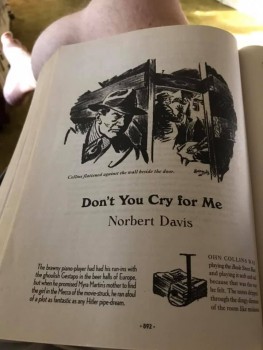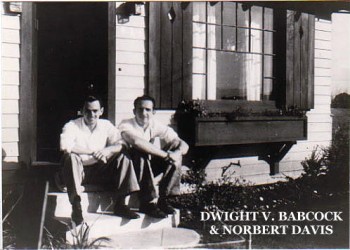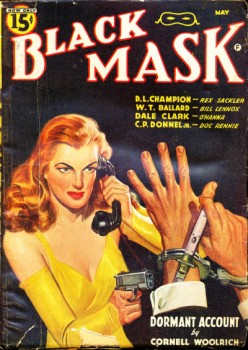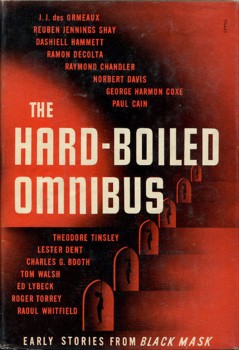A (Black) Gat in the Hand: Norbert Davis’ Don’t You Cry for Me’
 “You’re the second guy I’ve met within hours who seems to think a gat in the hand means a world by the tail.” – Phillip Marlowe in Raymond Chandler’s The Big Sleep
“You’re the second guy I’ve met within hours who seems to think a gat in the hand means a world by the tail.” – Phillip Marlowe in Raymond Chandler’s The Big Sleep
(Gat — Prohibition Era term for a gun. Shortened version of Gatling Gun)
On my Hardboiled Mount Rushmore, it’s Dashiell Hammett, Frederick Nebel, and then Norbert Davis. The fourth spot is a bit fluid, though the Jo Gar series often has Raoul Whitfield in that fourth spot. But today, we’re going to look at a Davis short story.
Davis was in law school at Stanford when he wrote his first story and sent it to Joe ‘Cap’ Shaw, the legendary editor of Black Mask. It was accepted, and by the time he graduated law school, he was successfully writing for the pulps. In fact, he was doing so well, he never sat for the bar, and spent the rest of his life as a writer, moving from the pulps to the higher-paying slicks. Sadly, took his own life at only the age of 40.
I’ve already written an essay on his Ben Shaley stories, which constituted two of the five Davis tales Shaw printed in Black Mask under his watch. After Shaw left, Davis appeared in Black Mask eight more times. I’m working on what I hope will be THE definitive essay on his Max Latin stories. I absolutely love that five-story series. They’re fantastic.
Between May 1942 and May 1943, Black Mask ran three stories featuring John Collins. Collins was a piano player who had done some investigation work on the side in Europe before World War II. “Don’t You Cry for Me” was the first of the three stories.
Picking Iron (trivia) – In May, 1942, Give the Devil His Due” ran in Dime Detective.
Of course, America was drawn into World War II on December 7, 1941.The story blurb for this one reads, “The brawny piano-player had had his run-ins with the ghoulish Gestapo in the beer halls of Europe, but when he promised Myra Martin’s mother to find the girl in the Mecca of the movie-struck, he ran foul of a plot as fantastic as any Hitler pipe-dream.” Pulp magazines used bombast long before Donald Trump did.
“John Collins was playing the Beale Street Blues and playing it soft and sad because that was the way he felt. The notes dripped through the dimness of the room like molasses and provided an appropriate accompaniment to his thoughts. He had a hangover.”
So opens our story. Davis writes well. He paints scenes well. I have noticed, he uses an inordinate number of adverbs. Which I think was a result of the fact he earned his living by the word: often at less than one cent per. Adverbs were money. But as the story’s first paragraph shows, he can set a mood.
The doorbell rings, ruining his solitude. Mrs. Della Martin, from Brill Falls, South Dakota, has come to Hollywood, looking for her daughter, Myra. Myra was a small-town girl who came to town to get into pictures. Myra wrote her mother regularly, then went silent. She had told her that Collins was good at finding people in Europe before the war. He said that was just something he did to help out friends, on the side. He was a piano-player. He doesn’t remember Myra, but he agrees to help.
Della hasn’t contacted the police – Maybe Myra doesn’t want to be found. Her mother just wants to be assured that she is okay, and tells him where Myra had been living. After she leaves, we get more of Davis’ mood-setting prose:
“It was cold in the apartment and dark in the corners where the light didn’t reach. Mrs. Martin’s drear, sad little story had left an ugly chill echo behind it. It was nothing you could touch, nothing you could see, but it was there. It was black and twisted and wickedly (adverb alert!) mirthful, and John Collins didn’t like even the thought of it.”
Fortifying himself with a swig of gin, he heads out to see what he can find. Which, of course, will be trouble.
Myra had been living in a run-down boarding house that “you can find in the back-washes of Hollywood if you care to look.” It had “a discouraged sag in its roof,” with floor boards that “moaned in protest,” and a “feeble night-light.”
The proprietor is a tall, thin man wearing a Turkish costume, and with a Turkish accent. A fake one, that is. Ali Singh Teke is really Alfred Peters. He’s an actor who gets Turkish parts, and stays in character while running the boarding house. He’s a phony, and Collins, who has “played in joints in Istanbul and Port Said and Cairo” knows it.
Peters tries to brush him off. We get a sense of Collins’ physical strength when he closes his palm into a fist with a coin inside it, and bends the coin in half. Peters is still a bit resistant, but Collins gets the truth out of him. He also tugs on the ends of Peter’s pretentious, pointy mustache, which is quite intimidating.
Collins finds out from Peters, who was a very nosy landlord, that Myra had called a hotshot director, Derek Van Diesten, who had fled from Hitler and come to Hollywood. Peters was going to call him up, talk about his own talent, and then casually bring up Myra – blackmailing the director into putting him in his pictures. Collins puts the fear of God in him when he says if he tries that, Van Diesten might send someone like him out to shut him up. Peters literally crumbles in front of him.
 The phone rings and it’s the obligatory, “Drop the case or you’ll be sorry” warning. Collins rushes off to the nearest pay phone, which is in a drug store around the corner. While he’s questioning the guy behind the counter, somebody takes a shot at him, then roars away in a car. That’s a nice addition of menace to the phone threat.
The phone rings and it’s the obligatory, “Drop the case or you’ll be sorry” warning. Collins rushes off to the nearest pay phone, which is in a drug store around the corner. While he’s questioning the guy behind the counter, somebody takes a shot at him, then roars away in a car. That’s a nice addition of menace to the phone threat.
As Collins mixes in with the crowd on the sidewalk, we see more of Davis’ writing ability: “He was an expert at this. He had the trick of blending into a throng of people and becoming as hard to keep track of as an individual wave in the ocean.”
After calling Van Diesten, who angrily denies knowing any Myra Martin, Collins goes to her mother’s hotel, where two guys grab him and take him up to a room. They’re cops, and en route, they shove a pushy reporter over a chair. They go to Della’s room, where Homicide Lieutenant of detectives Tilwitz (that’s a name?) is camped out. Someone had heard a shot and a scream. When a clerk used a passkey on the room, there was no sign of Della. Her luggage and items were gone, and so was she. There was a broken window, and a bloodstain on the rug. Tilwitz thinks somebody tied a rope around the radiator and lowered Della and all her stuff out the window.
He tells Collins to go ahead and try to find her. There’s been no complaint, and no known crime – he’s not going to do anything yet. He doesn’t even bother to have the two detectives (who he thinks are useless) follow Collins.
Rick Preston was the unemployed reporter looking for a story, and he accosts Collins in the lobby. Preston got drunk, messed up some work, and got fired. He’s trying to find a story so he can get his job back. Nothing much comes of the discussion.
Back home, Collins assesses things, including that acknowledging Tilwitz is no fool; the man will pounce when the time to act comes. In Nero Wolfe’s mysteries, ‘the doorbell rang’ often stirs up the plot. In this story, it’s a phone call. And this one is from Myra Martin, who asks him to come to the old Regent Studios. Then she hangs up.
Collins is a musician, not a private eye. Playing the piano effects his moods, and his thinking. He had been playing distractedly when the phone rang, and as he recalls the tune, Davis sets us up for the final act: “And now he knew the meaning of the secret little doubt that had pried at his mind, and he knew why Mrs. Della Martin had disappeared, and where, and he knew what had happened to Myra Martin, and why.”
Davis just doesn’t tell us Regent Studios is out of business. “Hollywood had gone away and left the Regent Studios. They were forlorn and alone in a residential area of small houses and small stores north of Santa Monica Boulevard. They dated back before sound – ancient history – and the tall stucco wall that surrounded them was crumbling and streaked with rain mold. There was one small light, wan and dim, burning over the massive iron gates of the main entrance.”
Got the picture? Good! And what could possibly go wrong, at night, at an abandoned movie studio, in a missing persons case? Things get convoluted from here on, and I had to read the ending a couple times to figure it out. Collins listens outside the door of a set building. Fortunately, the bad guy is inside, revealing his entire plot to Derek Van Diesten, the victim. X has killed Myra Martin, whose body is in the room. And he had laid a trail of false clues, making it appear that Myra had moved in with Van Diesten, who didn’t even know her. He’s going to put her body in the director’s car, then wreck it, keeping Van Diesten captive at the abandoned studio. It will look like Van Diesten killed Myra, ran off the road while trying to dispose of her body, then ran away.
X reveals he wants a job at Van Diesten’s studio, at a thousand dollars a week (good money back in 1942), as some kind of technical advisor. It won’t cost Van Diesten anything since the studio will pay, and X will stay quiet about Myra’s death (which Van Diesten didn’t have anything to do with, of course). The villain having (unwittingly) conveniently told everything to the protagonist, the hero now makes a sound, betraying his presence.
X turns off the light, Collins sneaks into the room and there’s a scuffle. When it’s done, X is dead, having shot himself in the chest during the tussle. And with the light back on, it’s revealed that X was….Rick Preston! I did not know who the bad guy was, and I was leaning towards Tilwitz, or one of the two detectives. Peters seemed too obvious, and he had disappeared from the story. I really didn’t know. But I didn’t suspect Preston at all.
 Now, Collins lays it all out for the confused Van Diesten, as well as the befuddled reader. It’s complicated. Myra, a somewhat big fish in a small pond, was getting nowhere in Hollywood. Myra disappeared, leaving behind some clues that, by inference, would point to the famous director. Then her mother came, looking for her. And she vanished, stirring up the search for Myra. The trail to one or the other would lead to him, with resultant publicity.
Now, Collins lays it all out for the confused Van Diesten, as well as the befuddled reader. It’s complicated. Myra, a somewhat big fish in a small pond, was getting nowhere in Hollywood. Myra disappeared, leaving behind some clues that, by inference, would point to the famous director. Then her mother came, looking for her. And she vanished, stirring up the search for Myra. The trail to one or the other would lead to him, with resultant publicity.
Tonight, things went sideways. He was to meet Myra, wondering what all of it was about. Della would later reappear, and he would also meet her. The two women would pressure him to help Myra’s career, and he’d play along so they didn’t make it look like something fishy had gone on with their disappearances. Frankly, I don’t get this part, the way Davis explains it. I just push through it to the next puzzle piece.
But somehow, Preston figured out what Myra was up to and realized he could switch it to a blackmail scheme, with a big payoff for him. Even if Van Diesten could prove he had nothing to do with their disappearances, his reputation would be ruined and he’d be finished in pictures. Preston could expect him to give in. The director reveals to Collins that he’s trying to become a citizen for himself, and his children. If he was associated with a crime, he’d not get citizenship. That’s why he had come tonight; he was worried about a scandal.
The problem with short stories is a lot of authors find themselves having to do a big info dump via exposition at the end of the story. Even good ones struggled because of the word counts. Collins continues on, explaining that Preston had fooled Myra into thinking he was on her side as he played along with her. But tonight, at the studio, he revealed his plan, and she balked. So he, killed her, adjusting on the fly. The faked disappearance became a real murder – still pointing at Van Diesten.
And, another plot twist! Myra was going to prove to the famous director what a good actress she was by revealing she was playing the part of her mother. She was Myra and Della. That was the ‘publicity’ (I’m still working on following Davis’ threads here). He would give her an acting job, either impressed by her talent, or in self-defense for being hoodwinked.
The grateful bigwig offers Collins a job, but the piano player explains he’s just waiting for the army to call him up. He’ll report the bodies to the police, but leave Van Diesten’s name out of it. He says Tilwitz isn’t going to believe whatever he hears so Collins is going to make up a whopper. He shows his soft side in the last sentence of the tale: “This is Myra’s last chance, and I’m going to give her as big a part to play as I can.”
I haven’t read the other two Collins stories, and I’m not aware of their ever having been reprinted. So, this is all I know about John Collins. It seems like there’s some room for someone with talent in that field, to write some stories about him in pre-World War II Europe. Kind of hardboiled suspense stories, filled with intrigue and danger.
The May, 1942 issue of Black Mask was a good one. Cornell Woolrich’s “Dormant Account” had the cover drawing. “Lights, Action-Killer” was the twenty-seventh and final short story about W.T. Ballard’s Hollywood studio troubleshooter, Bill Lennox. And “Blood from a Turnip,” by D.L. Champion, featured penny-pinching lawyer, Rex Sackler.
This isn’t one of my favorite Norbert Davis stories, but it’s still worth reading. And I’m curious what the other two John Collins stories are like.
Prior posts in A (Black) Gat in the Hand – 2020 Series (6)
A (Black) Gat in the Hand: Hardboiled May on TCM
A (Black) Gat in the Hand: Some Hardboiled streaming options
A (Black) Gat in the Hand: Johnny O’Clock (Dick Powell)
A (Black) Gat in the Hand: Hardboiled June on TCM
A (Black) Gat in the Hand: Bullets or Ballots (Humphrey Bogart)
A (Black) Gat in the Hand: Philip Marlowe – Private Eye (Powers Boothe)
A (Black) Gat in the Hand – 2019 Series (15)
Back Deck Pulp Returns
A (Black) Gat in the Hand Returns
A (Black) Gat in the Hand: Will Murray on Doc Savage
A (Black) Gat in the Hand: Hugh B. Cave’s Peter Kane
A (Black) Gat in the Hand: Paul Bishop on Lance Spearman
A (Black) Gat in the Hand: A Man Called Spade
A (Black) Gat in the Hand: Hard Boiled Holmes
A (Black) Gat in the Hand: Duane Spurlock on T.T. Flynn
A (Black) Gat in the Hand: Andrew Salmon on Montreal Noir
A (Black) Gat in the Hand: Frank Schildiner on The Bad Guys of Pulp
A (Black) Gat in the Hand: Steve Scott on John D. MacDonald’s ‘Park Falkner’
A (Black) Gat in the Hand: William Patrick Murray on The Spider
A (Black) Gat in the Hand: John D. MacDonald & Mickey Spillane
A (Black Gat in the Hand: Norbert Davis goes West(ern)
A (Black) Gat in the Hand: Bill Crider on The Brass Cupcake
 A (Black) Gat in the Hand – 2018 Series (31)
A (Black) Gat in the Hand – 2018 Series (31)
With a (Black) Gat: George Harmon Coxe
With a (Black) Gat: Raoul Whitfield
With a (Black) Gat: Some Hard Boiled Anthologies
With a (Black) Gat: Frederick Nebel’s Donahue
A (Black) Gat in the Hand: Thomas Walsh
A (Black) Gat in the Hand: Black Mask – January, 1935
A (Black) Gat in the hand: Norbert Davis’ Ben Shaley
A (Black) Gat in the Hand: D.L. Champion’s Rex Sackler
A (Black) Gat in the Hand: Dime Detective – August, 1939
A (Black) Gat in the Hand: Back Deck Pulp #1
A (Black) Gat in the Hand: W.T. Ballard’s Bill Lennox
A (Black) Gat in the Hand: Day Keene
A (Black) Gat in the Hand: Black Mask – October, 1933
A (Black) Gat in the Hand: Back Deck Pulp #2
A (Black) Gat in the Hand: Black Mask – Spring, 2017
A (Black) Gat in the Hand: Frank Schildiner’s ‘Max Allen Collins & The Hard Boiled Hero’
A (Black) Gat in the Hand: William Campbell Gault
A (Black) Gat in the Hand: More Cool & Lam From Hard Case Crime
A (Black) Gat in the Hand: MORE Cool & Lam!!!!
A (Black) Gat in the Hand: Thomas Parker’s ‘They Shoot Horses, Don’t They?’
A (Black) Gat in the Hand: Joe Bonadonna’s ‘Hardboiled Film Noir’ (Part One)
A (Black) Gat in the Hand: Joe Bonadonna’s ‘Hardboiled Film Noir’ (Part Two)
A (Black) Gat in the Hand: William Patrick Maynard’s ‘The Yellow Peril’
A (Black) Gat in the Hand: Andrew P Salmon’s ‘Frederick C. Davis’
A (Black) Gat in the Hand: Rory Gallagher’s ‘Continental Op’
A (Black) Gat in the Hand: Back Deck Pulp #3
A (Black) Gat in the Hand: Back Deck Pulp #4
A (Black) Gat in the Hand: Back Deck Pulp #5
A (Black) Gat in the Hand: Joe ‘Cap’ Shaw on Writing
A (Black) Gat in Hand: Back Deck Pulp #6
A (Black) Gat in the Hand: The Black Mask Dinner
 Bob Byrne’s ‘A (Black) Gat in the Hand’ was a regular Monday morning hardboiled pulp column from May through December, 2018 and again from August through December, 2019. It returned in June, 2020.
Bob Byrne’s ‘A (Black) Gat in the Hand’ was a regular Monday morning hardboiled pulp column from May through December, 2018 and again from August through December, 2019. It returned in June, 2020.
His ‘The Public Life of Sherlock Holmes’ column ran every Monday morning at Black Gate from March, 2014 through March, 2017 (still making an occasional return appearance!).
He organized ‘Hither Came Conan,’ as well as Black Gate’s award-nominated ‘Discovering Robert E. Howard’ series.
He is a member of the Praed Street Irregulars, founded www.SolarPons.com (the only website dedicated to the ‘Sherlock Holmes of Praed Street’) and blogs about Holmes and other mystery matters at Almost Holmes.
He has contributed stories to The MX Book of New Sherlock Holmes Stories – Parts III, IV, V, VI and XXI.